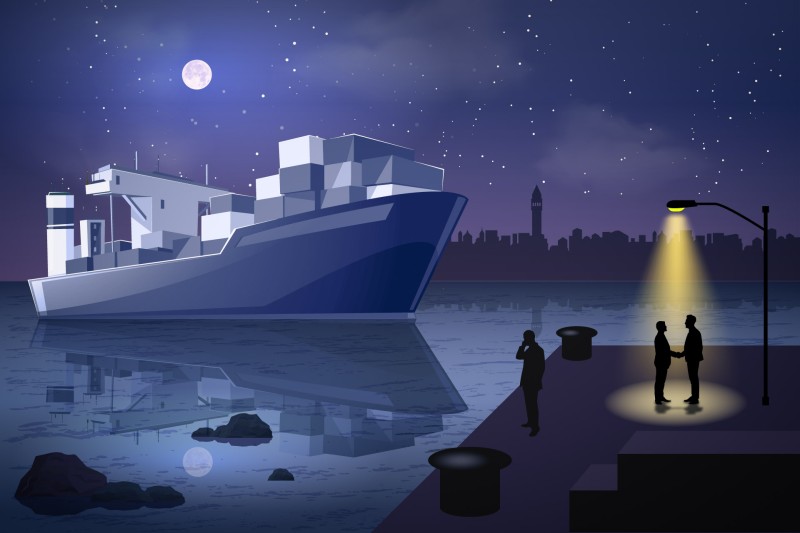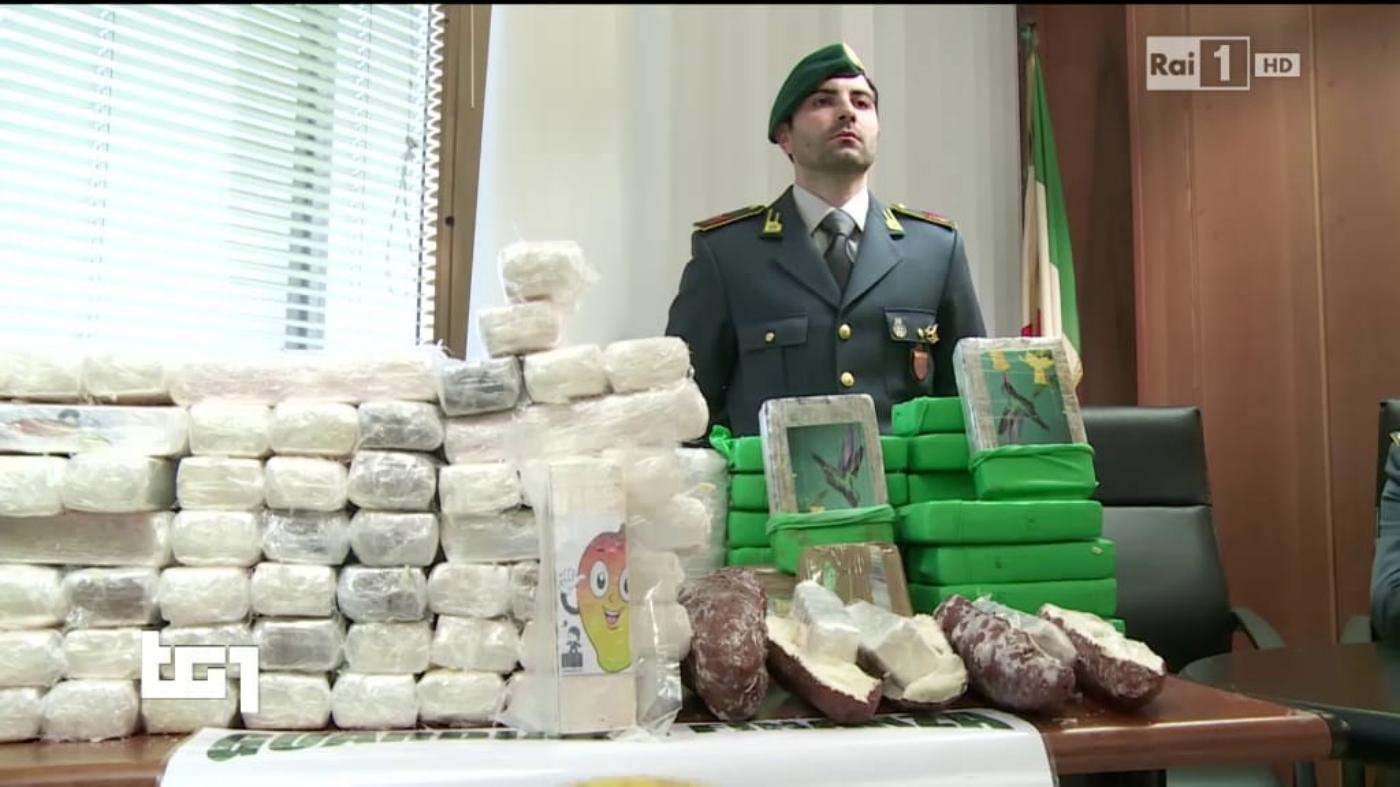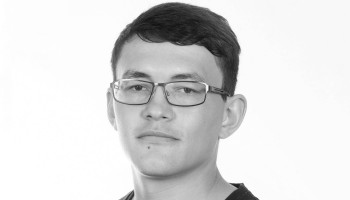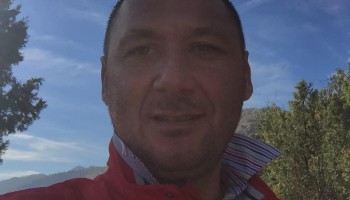In a nondescript shopping mall in the industrial outskirts of Venice, a major new European drug route is taking shape.
Antonino Vadalà, a hot-headed man who dominates the room, sizes up his potential partner, a local businessman he hopes will help him import hundreds of kilos of cocaine into northern Italy and Slovakia.
The plan is to use legal goods to disguise the drug shipments.
“We load bananas, cereal, nuts, we load some bullshit,” Vadalà says. “We ship it to your company ... and we pay off customs. We clear it with them when [the container] arrives.”
Vadalà, 44, a Calabrian expatriate who lives in Slovakia, is a member of the second generation of Italian men to leave their mafia-dominated hometown to settle in the Central European nation. Officially, he raises cattle and sells beef. But prosecutors in Venice allege that Vadalà is also a drug trafficker who worked with the 'Ndrangheta, one of the world's most powerful organized criminal groups, to open a major new cocaine route into Europe.
This report is based on two indictments from courts in Venice and Milan and interviews with detectives and prosecutors. Journalists from IRPI and Investigace.cz, both member centers of OCCRP, began looking into Vadalà in 2016 in collaboration with Ján Kuciak, a Slovak investigative reporter who had come across Vadalà’s name in his work.
Kuciak found that a young female assistant of Slovak Prime Minister Robert Fico had once co-owned a business with Vadalà — and that the Italian had allegedly scammed the European Union out of 120,000 euros in agricultural subsidies.
On Feb. 21, 2018, Kuciak and his fiancee, Martina Kušnírová, were killed in their home in a Slovak village. Within days, OCCRP and its member centers published several stories they had been working on with him. Now, a year later, reporters are in a position both to dig deeper into the circumstances of Kuciak’s death and to continue his work. In particular, they’ve been able to trace the rise and fall of Vadalà’s ambitious Venetian enterprise.
A New Route
The shopping mall meeting where Vadalà talked about stashing cocaine amid legal imported goods took place in September 2014.
The mall, Valecenter, was in a strategic location. Three highways crossed nearby: one leading to the airport, one heading north toward Austria, and one going southwest. If you drove far enough in that direction you’d reach Reggio Calabria, the Italian province where Vadalà’s family is based and where the ‘Ndrangheta coalesced as a mafia syndicate in the late 1800s.
Any of the highways could provide a quick escape in case lookouts spotted police.
It was here, to Venice, that Vadalà wanted to import loads of cocaine across the ocean from Ecuador and Peru. The commercial harbor here was less strictly policed than the one in Calabria. It also had two other advantages: It was free from the dominance of any one mafia clan, and it served as a home base for Francesco Giraldi, the import-export entrepreneur Vadalà was teaming up with.
While Vadalà and Giraldi talked business, each was supervised by a senior ‘Ndrangheta member: Leo Zappia, 61, was there to guide Vadalà; and Vittorio Attilio Violi, in his mid-50s, was overseeing Giraldi.
While the four men met, two others were on guard, looking for any sign of law enforcement.
Violi — sometimes called “peg leg” for the limb he lost after a 2010 shootout in Calabria — led the Venetian operations of the Morabito, a Calabrian clan that operates under the ‘Ndrangheta’s umbrella. The group is also known as Tiradrittu (the straight-shooters) after the nickname bestowed on its founder’s father for his willingness to shoot his enemies and his accuracy when he did so.
Violi served as an important 'Ndrangheta chief in Venice, making it his job to export the syndicate’s practices and operations from Calabria to the northern Italian port city and surrounding province.
It’s in that capacity that he had been scouring Venice for an import-export partner to handle Vadalà’s proposed drug shipments. That’s how he met Giraldi.
Zappia, “the white-haired one” in attendance as Vadalà’s more senior adviser, is 'Ndrangheta aristocracy: His uncle, Giuseppe Morabito, was one of the most powerful bosses the syndicate ever had, and once led one of its three major mandamentos, or branches. The elderly Morabito is now serving a life prison term, but his clan’s power is still felt all over the world through his disciples — among whom Zappia is king.
“I want to ship 200, 300 kilos at a time,” Vadalà said to Giraldi. “You understand? Minimum 200, 300.” This would be enough cocaine to fill the trunks of several cars, and he needed to know whether Giraldi, the importer and exporter, could really deliver enough Latin American fruit or other legal goods to conceal such a volume.
Vadalà was particularly interested in legitimate products from Ecuador and Peru, two countries where he had existing contacts and from which he was planning to secure his supplies.
From there, the drugs could be ushered through Giraldi’s import business in Venice (via shipments ordered by Vadalà’s Slovak company) and end up either in Italy or in Slovakia.
Coke is King
Secreting cocaine in refrigerated shipping containers has become the most common method of moving the illicit powder around the world. Fruit grown in Latin America, like bananas and pineapples, help speed the drug through customs, because perishable produce can’t be allowed to linger too long in port. Customs agents are less likely to check such shipments, or do so quickly to keep them moving.
(Read an earlier OCCRP investigation about how cocaine disguised in banana shipments was smuggled into Belgium.)
On that day in Venice in 2014, Vadalà and his associates wanted to ensure they could grab their share of the lucrative European cocaine market.
The men discussed a plethora of practical details: how to organize shipments, how they’d be loaded, who to use as their Latin American suppliers, and so on. Giraldi claimed to know reliable custom officials in the Venice port.
“The compare knows his job,” Zappia said, referring to Giraldi.
Violi smiled in agreement. “The compare knows his job very well,” he said.
As the meeting came to an end, with the men agreeing on how to start their new venture, Vadalà pocketed a business card for Giraldi’s company, Gi.Fra, which they planned to use as an importer.
From Cowboy to Coke Boy
Antonino Vadalà, also known as Bovino (meaning “veal”), was born in 1975 in a small town on Italy’s Calabrian coast. He grew up in a rural area surrounded by hills and bordered by the Aspromonte mountains, a ruggedly beautiful but poor region known for cattle breeding.
Since the 1980s, organized criminal groups have controlled all business in the area, police say, though Antonino Vadalà family hasn’t historically played a major role.
Antonino’s move abroad came after Reggio Calabria anti-mafia prosecutors indicted him and two brothers for aiding an ‘Ndrangheta fugitive in 2001. (All three were later acquitted of the charges.)
The brothers escaped to Slovakia, where Antonino’s future father-in-law, Diego Rodà, was waiting.
Rodà had decamped to eastern Slovakia in 1993 at the same time as wave of bloody mafia feuds roiled his Calabrian home region on Italy’s eastern coast. His next step was to build the same type of cattle business that his family ran in Calabria. Eventually, it made him a millionaire.
According to Venice Financial Police Major Salvatore Rubbino, Violi was recorded describing Rodà as one of the ‘Ndrangheta’s bosses in Slovakia, but he has never been investigated or charged with any crimes.
Reached by reporters, Rodà’s lawyer Antonino Curatola said any suggestion that his client was involved with organized crime was “groundless.” Rodà “was never investigated in Italy for such a thing,” Curatola said.
In 2001, Vadalà joined Rodà in Slovakia and later even married his daughter Elisabetta.
In his new home, Vadalà built a legitimate cattle breeding and import-export business. He also began developing a network of contacts among regional politicians and influential personnel within the Slovak secret services. One of his cattle companies, Bovinex Europa, even rented storage space to the customs service in Bratislava.
A 2015 investigation by the Financial Police of Venice (the Guarda di Finanza) sheds light on some of Vadalà's less legal activities during this period. Investigators concluded that his business dealings had long included drug trafficking and that he and his relatives made a practice of finding protection with public officials in the countries where they operated.
It was around this time that Vadalà appears to have made a decision to grow his drug trafficking business — and to work with senior ‘Ndrangheta figures.
To do so, he needed a blessing from a powerful clan back home. The most logical choice were the Morabitos, not only because they are the drug trafficking leaders within the ‘Ndrangheta, but because Vadalà’s hometown was under their control. This clan’s invitation for him to participate in their drug deals would be his “magic entry point” to the syndicate’s global cocaine trade.
Prosecutors say that Vadalà’s family paid the Morabitos 1 million euros in cash to secure this privilege. Leo Zappia — the man who would end up supervising Vadalà during the shopping mall meeting — was allegedly the one who received the cash.
The connection had been made through an old friend. “It appears that Vadalà was connected to Leo Zappia through his father-in-law, Diego Rodà,” Rubbino said in an interview.
Hand-in-Hand With Customs
By April 2015, six months after meeting in Venice for the first time, Vadalà and Giraldi were ready to start their cocaine shipments.
Legitimate cover businesses were imperative: The more legal products and money that flowed through the import company, the less likely it was that the cargo would be subject to random customs checks.
Vadalà was well prepared. “I have commercial activities, I have companies,” he said in a recorded conversation. “I once bought 20 million euros of meat [in Latin America] through real contracts. I supplied Ankara, the Turkish state, for a year. And now I’m signing a contract with Uruguay, Paraguay, and Brazil.”
The police “can check anything,” he added. “Financial flows? I have everything ok.”
Vadalà planned to open a company in Ecuador to buy goods that would mask the real purpose of his new trade route through Venice, investigators concluded. The idea was for the containers to stop in Venice, have the drugs unloaded, then carry the legal cargo on to Slovakia. Another option was to have the containers go straight to Slovakia, be cleared by customs, and then go to Venice.
This is where Vadalà’s Slovak contacts and businesses came in handy.
“I have five hectares at Slovakia’s largest customs depot,” Vadalà said. “The head ... there is my man, I put him there.” He promised Giraldi cooperation from corrupt customs officials as well as from the SIS, Slovakia’s intelligence agency. “I know them all,” he said.
It was the kind of statement that would get him and his drug ring busted.
Vadalà wasn’t just talking to Francesco Giraldi, importer-exporter — he was talking to undercover agent 8067 of the Venice Financial Police.
Giraldi’s entire identity — including his import-export business — had been built by law enforcement to infiltrate the ‘Ndrangheta.
Two Police Operations
Vadalà’s drug trade with Giraldi didn’t begin very smoothly.
His first shipments were supposed to come from Ecuador. In that country’s main port of Guayaquil, Vadalà had associates he could count on to load the cocaine onto containers that would carry frozen shrimp.
Vadalà used his Slovak company, Terra Real, to transfer 125,000 euros to Giraldi’s business in Venice, adding another 50,000 euros in cash. The money was used to purchase the shrimp and 70 kilos of cocaine.
But when the load reached Venice on May 16, 2015, it contained only shrimp. Apparently there had been a miscommunication, and the cocaine was never loaded.
Fortunately for Vadalà, he was also in talks with Mario Palamara, a well-connected Morabito broker in Milan who had access to cocaine suppliers in Latin America.
The channels Palamara opened for Vadalà seemed to work out better than the Ecuadorian misadventure. Using the same strategy of first bringing in only legal goods — in this case bananas — the group successfully imported 243 kilos of cocaine from Santa Marta in October 2015.
The drugs were split into bricks of one kilo each, with most of them sent to Palamara's group in Milan, which was in charge of distribution.
Even after the successful Colombian route was established, there were other problems.
In November 2015, the carabinieri (military police) in Milan stopped a sport utility vehicle carrying 30 kilos of white powder. The cocaine had originated in the 243 kilogram shipment that had arrived in Venice along with more bananas.
"At that time we noticed great turmoil within the drug ring,” Colonel Nicola Sibilia, head of the Anti-Organized Crime Unit of the Venetian Financial Police, told OCCRP.
As a result of the seizure, “Palamara is convinced that there’s an undercover [police officer in the group], and points the finger at Giraldi, the only non-Calabrian,” Sibilia explained. “Violi defends him with a sword; he is ‘his’ man. Palamara then proposes testing Giraldi, giving him an assignment to transport to Milan another 30 kilos left in the Venice warehouses.”
This put Giraldi and the other police officers in a difficult situation. If the Milan police seized this shipment, Giraldi’s cover would be blown, risking his life and ending the undercover operation. On the other hand, it is difficult for the police to leave a 30 kilogram cocaine shipment untouched.
A decision was made to follow the shipment without seizing it.
“It was a difficult time. We had to coordinate a controlled delivery operation that could put our undercover agent [Giraldi] at great risk," Sibilia said.
The shipment arrived at its destination unimpeded, and Giraldi appeared to have earned back Palamara’s trust. The undercover operation and the drug imports both continued.
Deadly Connections
Both Vadalà and Palamara were observed travelling to Colombia by Venetian investigators.
The men soon contracted a new Colombian banana exporter, a company called Lorenzo Bello Diaz Y Cia Ltda. The first cocaine shipment hidden in bananas from Bello Diaz — 222 kilos in 188 bricks — arrived in December 2015.
Lorenzo Bello Diaz, the head of the exporter, said he was unaware of any such cocaine-tainted shipment and that he did not know Vadalá or Palamara. He did remember selling a load of bananas to Giraldi through a third company, and said that the Italians owe him tens of thousands of dollars.
The banana exporter is based in Colombia’s northwestern Uraba province, one of the country’s main banana cultivation regions. The area is under the control of the Clan del Golfo, one of the most powerful criminal groups in Colombia. Any illegal shipment passing through the region’s ports must go through them.
The group consists mostly of former paramilitaries who also have alliances with legal businesses.
"Uraba is one of the birthplaces of the paramilitaries in Colombia,” explained Ariel Ávila, a security analyst with the Colombia-based Peace and Reconciliation Foundation.
“Since the ’80s, company executives and landowners [in the region] have made alliances with illegal groups,” he said. “Today, drug traffickers are still intertwined with a lot of legal businesses, among them banana exporting. ... Many loads [of cocaine] are shipped directly from the banana plantations.”
Ripped Off
In the fall of 2015, Vadalà had provided Giraldi (agent 8067) with 125,000 euros to co-finance a shipment of cocaine Palamara had procured through a Colombian fish company. But the load never materialized.
Vadalà and Zappia, his Morabito “tutor,” were furious at Palamara.
As a central link between all these characters, Violi — the Morabito boss who had offered the port of Venice as an unloading point — was trapped in the middle. He organized a meeting in Venice, at the very shopping mall where the partners had met to begin their venture, to try to calm things down.
“I'll take care of this one [Palamara] myself,” Zappia said. “I'll order for his family to be kidnapped.”
To salvage the situation, Violi had to promise that the 125,000 euros would be paid back.
Giraldi started to get nervous too. After the meeting, he wrote a long memo describing the situation that captured Vadalà’s increasingly important stature within the ‘Ndrangheta’s drug business.
“Vadalà ... told [his Calabrian bosses] that he had been robbed, and Violi was worried [they] would ‘kidnap’ Palamara,” he wrote. “They know that Vadalà does drug trafficking, has already done many [drug trafficking] jobs, and doesn’t throw away money.”
According to Giraldi’s notes, Violi demanded that Palamara solve the problem of the missing drugs, or else he himself would be put in a difficult situation after having vouched for him.
Behind Bars
A new shipment of cocaine and bananas from Lorenzo Bello Diaz, the Colombian exporter, would have saved Palamara, showing that he was able to arrange successful shipments. But this is when the police struck.
It had been 18 months of dangerous undercover work — one of the only such operations to successfully infiltrate the ‘Ndrangheta. On Dec. 3, 2015, 150 officers from the Venice Financial Police raided Giraldi’s warehouse, arresting Violi, Giraldi himself (to protect his identity), and two other associates who were busy unloading 88 kilos of cocaine from a Costa Rican shipment of fake tapioca roots.
A week later, too late to help Palamara, the Lorenzo Bello Diaz bananas — along with 222 kilos of cocaine — finally reached the warehouse. The Financial Police were there to pick it up.
Palamara himself was already on the run, and has been a fugitive ever since. He could not be reached for comment.
Meanwhile, Vadalà remained in Slovakia, not bothering to hide and seemingly unconcerned about any law enforcement action against him.
He was even able to continue running his successful legal businesses — until last winter. On Feb. 28, 2018, two days after Kuciak’s body, and that of his fiancee, were found, the Court of Venice finally issued an arrest warrant for Vadalà, Palamara, and the rest of the drug ring.
Vadalà was arrested in Slovakia on March 13, 2018. He has been extradited to Italy, where he is in jail and awaiting trial. His lawyer, and those representing Violi and Zappia, did not respond to requests for comment.
Violi remains in jail — perhaps the safest place for an ‘Ndrangheta man who had vouched for an undercover officer.
With additional reporting by Nathan Jaccard, Pavla Holcova, and Eva Kubániová.









